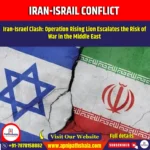GS Paper I: Physical Geography GS Paper II: India and its neighborhood relations, Grouping and agreements involving India and affecting its interests. |
Why in the News?
India has issued a new formal notice to Pakistan requesting the “review and modification” of the Indus Waters Treaty (IWT), following a similar request made in January 2023.
This latest notice, issued under Article XII (3) of the IWT, is significant because the mention of “review” indicates India’s potential intention to revoke and renegotiate the 64-year-old treaty.
Article XII (3) permits modifications to the treaty through a formally ratified agreement between the two governments.
What’s in today’s article?
- Indus Waters Treaty (IWT)
- Indus Waters Treaty – Summary of Provisions
- Rights and Obligations under the Treaty
- Indus Waters Treaty Issues
- India demands modification of IWT
Indus Water Treaty (IWT)
About:
- The treaty is a water-sharing agreement between India and Pakistan, facilitated by the World Bank.
- Under the treaty, the rivers Ravi, Sutlej, and Beas were allocated to India, while the rivers Sindh, Jhelum, and Chenab were allocated to Pakistan.
Indus Waters Treaty (IWT)
- The IWT was signed by Indian Prime Minister Jawaharlal Nehru and Pakistani President Ayub Khan. The treaty, brokered by the World Bank (formerly the International Bank for Reconstruction and Development), was the result of nine years of negotiations.
- Since the partition of India in 1947, the Indus River has been a point of contention among the four countries it flows through—India, Pakistan, China, and Afghanistan. The river originates in Tibet.
- In 1948, India temporarily blocked water supplies to Pakistan but later restored them following a ceasefire. In 1951, Pakistan brought the issue to the United Nations, accusing India of cutting off water to several Pakistani villages.
- Based on UN recommendations, the World Bank developed the agreement in 1954, which was eventually signed on September 19, 1960.
Indus Waters Treaty – Summary of Provisions
The treaty outlines the terms for sharing the waters of the Indus River and its five tributaries:
- India controls the three eastern rivers:
- Ravi
- Beas
- Sutlej
- India has unrestricted use of the waters from these eastern rivers unless specific situations arise that require otherwise.
- Pakistan controls the three western rivers:
- Indus
- Chenab
- Jhelum
- A Permanent Indus Commission, established by the United Nations, is responsible for resolving disputes related to water sharing and provides a mechanism for arbitration to settle conflicts amicably.
- Under the treaty, India may use water from the western rivers for domestic and non-consumptive purposes such as storage, irrigation, and electricity generation.
- The treaty allocates 20% of the water from the Indus River System to India, with the remaining 80% going to Pakistan.
- When carrying out flood protection or control projects, both countries are required to minimize material damage to the other country as much as possible.
- The natural channels of the rivers may be used for discharging flood or excess waters without limitation by either country, and neither country can claim damages for such use.
Rights and Obligations under the Treaty
- India is required to allow the waters of the western rivers to flow freely, with exceptions only for specific consumptive uses.
- The treaty allocates approximately 80% of the total water from the six-river Indus system to Pakistan, leaving India with just 19.48% of the total water.
- India is permitted to build storage facilities on the western rivers up to a capacity of 3.6 million acre-feet, though it has not yet utilized this capacity.
- The IWT allows for run-of-the-river projects on the western rivers, provided they meet certain design and operational criteria.
- India must give Pakistan prior notification, including design details, of any new projects.
Dispute redressal mechanism under the Treaty
Article IX of the Treaty outlines a three-tier dispute resolution mechanism for addressing differences or disputes related to projects on the Indus waters.
First Level:
- Either party must notify the other of any planned projects on the Indus River, providing all necessary information as requested.
- This process is managed by the Permanent Indus Commission (PIC), which is responsible for implementing and overseeing the goals of the IWT.
- If the PIC cannot resolve the issue, it is escalated to the second level.
Second Level:
- At this stage, the World Bank appoints a neutral expert to address the differences.
- If the neutral expert cannot resolve the issue, it escalates to the third level.
Third Level:
- The matter is then taken to a Court of Arbitration (CoA), with the chairperson appointed by the World Bank.
Indus Waters Treaty Issues
There have been various issues related to the treaty, with both sides accusing each other of violating its terms:
- In 2016, Pakistan raised concerns with the World Bank about India’s Kishenganga and Ratle hydroelectric power projects in Jammu & Kashmir. India requested neutral experts to review the projects, arguing that Pakistan’s concerns were technical and did not warrant arbitration. Following discussions on the treaty’s technicalities, the World Bank allowed India to proceed with the projects.
- The Tulbul Project, a navigation lock and control structure on the Jhelum River, was suspended in 1987 due to Pakistani objections. Recently, the Indian government decided to review the suspension despite Pakistan’s protests.
- Pakistan’s Left Bank Outfall Drain (LBOD) project, which passes through the Rann of Kutch in Gujarat, was built without India’s consent. India has objected to the project as it violates the IWT and raises concerns about potential flooding in Gujarat.
- Bilateral Relations: The relationship between India and Pakistan has deteriorated recently. After the Uri attacks, Prime Minister Modi suggested that India’s support for the IWT could be reconsidered in light of Pakistan’s support for cross-border terrorism. Some experts believe the treaty is more favorable to Pakistan.
- Signing Authority: There is criticism that the IWT was signed by then-Prime Minister Nehru, who was not the head of state at the time. It is argued that the treaty should have been signed by the then-president.
- Water Utilization: India does not fully utilize its allocated water share under the IWT.
- Post-Pulwama Attacks: In response to the Pulwama attacks in 2019, the Indian government announced plans to divert all water from the three eastern rivers into Haryana, Punjab, and Rajasthan for various uses.
- Steps to Maximize Water Use:
- Shahpurkandi Project: Aims to generate power for Punjab and Jammu & Kashmir.
- Ujh Multipurpose Project: Will store water from the Ujh, a tributary of the River Ravi, for irrigation and power generation.
- 2nd Ravi-Beas Link below Ujh: A national project involving the construction of a barrage across the Ravi to divert water through a tunnel to the Beas Basin, aimed at reducing excess water flow into Pakistan.
India Demands Modification of IWT
- About the News:
- India has issued a formal notice to Pakistan requesting a review of the Indus Waters Treaty (IWT), citing fundamental and unforeseen changes in circumstances.
- Persistent cross-border terrorism is also highlighted as a reason for the demand to reassess the treaty.
- The notification emphasizes that changes in circumstances necessitate a reassessment of the obligations under various articles of the treaty.
- India had previously sent a notice to Pakistan in January 2023 seeking amendments to the 1960 treaty.
- Reasons for India’s Demand to Renegotiate the Treaty:
- The latest notice from India to Pakistan regarding the IWT cites “fundamental and unforeseen changes in circumstances” as the basis for the reassessment.
- Key concerns include shifts in population demographics, environmental issues, the need for clean energy development to meet emission targets, and the impact of cross-border terrorism.
- Controversy surrounds two Indian hydropower projects in Jammu & Kashmir—Kishanganga and Ratle—which Pakistan claims violate the IWT. These projects are designed as “run-of-the-river” and generate electricity without obstructing river flow.
- Reason Behind the January 2023 Notice:
- The January 2023 notice followed Pakistan’s objections to the two Indian hydropower projects.
- Pakistan initially sought a “Neutral Expert” to address its concerns but later proposed the Permanent Court of Arbitration (PCA) for adjudication.
- India objected to the PCA, arguing that it breached the treaty’s sequential dispute resolution mechanism, which starts with the Indus Commissioners, progresses to a Neutral Expert, and only reaches the PCA if needed.
- The World Bank had paused both processes in 2016, urging both countries to resolve the issue amicably.
- Despite India’s attempts, Pakistan did not engage in discussions between 2017 and 2022.
- In 2022, the World Bank decided to proceed with both the Neutral Expert and PCA processes, prompting India’s January 2023 notice, the first such notice in over 60 years.
Explore our courses: https://apnipathshala.com/courses/
Explore Our test Series: https://tests.apnipathshala.com/









